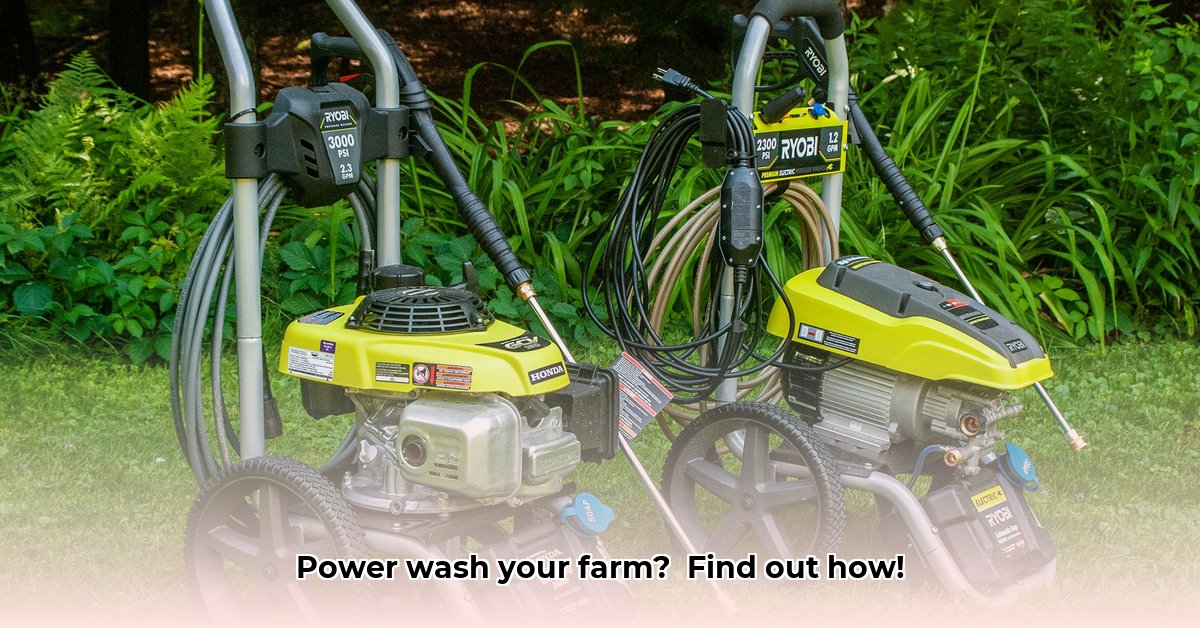
Choosing the Right Power Washer for Your Farm
Selecting the right power washer from Tractor Supply is crucial for efficient and sustainable farming. Think about it like choosing the right tool – you wouldn’t use a screwdriver to hammer a nail, right? The same applies here. Consider these key factors:
- PSI (pounds per square inch): This measures cleaning power. Higher PSI means more power, suitable for tough jobs like cleaning heavy equipment. However, excessive pressure can damage delicate surfaces and waste water. Aim for a model with adjustable PSI to tailor the cleaning power to different tasks.
- GPM (gallons per minute): This indicates water flow rate. Higher GPM means faster cleaning, but it also means more water consumption. Prioritize models with lower GPM for greater water efficiency.
- Engine Type: Gas-powered washers generally offer higher PSI but produce emissions and require more maintenance. Electric models are quieter, cleaner, and often more water-efficient, ideal for less demanding tasks. Consider the types of cleaning tasks you perform most frequently.
- Features: Look for features that improve water efficiency. Adjustable pressure settings allow you to precisely control water usage and prevent damage to surfaces. Different nozzle types optimize cleaning for various surfaces; a fan nozzle is best for larger areas, while a pencil jet is ideal for precise cleaning. Automatic shut-off nozzles further enhance water conservation.
For a wider selection, check out Tractor Supply power washers.
"Balancing PSI and GPM is key," says Dr. Emily Carter, Agricultural Engineer at Cornell University. "A higher PSI with a lower GPM often provides the optimal balance of cleaning power and water efficiency."
Here's a comparison table to help you visualize:
| Feature | High-Pressure Gas Power Washer | Low-Pressure Electric Power Washer |
|---|---|---|
| Cleaning Power | High | Moderate |
| Water Usage | Potentially Higher | Lower |
| Noise Level | High | Low |
| Maintenance | More demanding | Less demanding |
| Initial Cost | Generally Higher | Generally Lower |
| Environmental Impact | Higher (emissions) | Lower |
Sustainable Cleaning Techniques: Maximizing Water Efficiency
Sustainable power washing isn't just about cleaning; it's about cleaning smartly. Every drop counts!
1. Pre-Cleaning: Before engaging the power washer, remove loose dirt and debris with a broom, brush, or a light hose pre-wash. This significantly reduces water usage by minimizing the pressure washing time required.
2. Nozzle Selection: Choose the appropriate nozzle for each surface. A fan nozzle is more efficient for wide areas, while a pencil nozzle is better for targeted cleaning. Avoid high-pressure nozzles unless absolutely necessary.
3. Pressure Adjustment: Begin with the lowest pressure setting that effectively cleans the surface. Gradually increase the pressure only if needed. Overly high pressure wastes water and can damage surfaces.
4. Targeted Cleaning: Aim the nozzle precisely at the soiled area to avoid unnecessary spraying and water waste.
5. Water Recycling (When Feasible): If cleaning non-contaminated surfaces (e.g., a paved area), consider collecting the wastewater for reuse in less sensitive applications like irrigation.
Power Washing Applications in Sustainable Agriculture
Pressure washers, properly used, can improve the sustainability of your farming operation:
- Irrigation System Maintenance: Regular cleaning prevents clogs and ensures efficient water distribution, significantly reducing water waste.
- Greenhouse Cleaning: Clean solar panels and greenhouse structures to maximize light penetration and energy efficiency; cleaner surfaces yield maximum power output.
- Farm Equipment Cleaning: Removing soil and organic matter from equipment prevents rust and disease spread, extending equipment lifespan. This reduces waste associated with premature equipment replacement.
Maintenance and Longevity: Extending Your Pressure Washer's Life
Proper maintenance is essential for efficient, long-term water conservation.
- Post-Use Drainage: Always drain the water from the pump. Standing water inside the pump promotes corrosion and reduces overall lifespan.
- Regular Inspections: Check hoses, nozzles, and filters (if applicable) for wear and tear. Address any issues promptly. Consult your owner's manual for recommended maintenance schedules.
- Oil Changes (for gas-powered models): Regularly changing the oil is vital for engine performance and longevity. Refer to your owner's manual for the correct oil type and frequency.
Alternatives and Considerations: When Power Washing Isn't Ideal
Though beneficial, power washing isn't always the most sustainable option. For smaller cleaning tasks, manual scrubbing with soap and water may prove more efficient and environmentally friendly, particularly when water resources are limited.
Conclusion: Sustainable Power Washing on the Farm
By selecting the right power washer and employing efficient cleaning techniques, you can significantly improve the sustainability of your farm. Remember to prioritize water conservation, maintain your equipment diligently, and choose alternative methods when appropriate. With a thoughtful approach, a power washer can become a valuable asset in your eco-conscious farming practices.